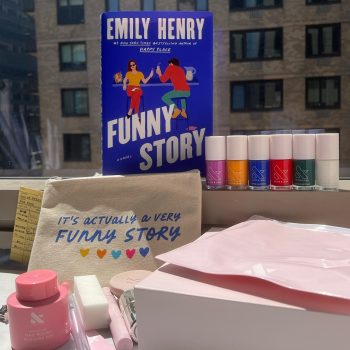Emily Henry has become a staple name in contemporary romantic fiction, known for her wit, heart, and the quietly profound emotional journeys tucked inside breezy romcom plots. Funny Story, her latest novel, follows this familiar pattern while offering a slightly quieter, more introspective story than some of her previous hits. It may not be her most explosive work, but it brims with charming characters, raw vulnerability, and those tender, awkward moments of connection that make her writing so addictive.
ALSO SEE: Book review: ‘The Favourites’ by Layne Fargo
Synopsis
Daphne always loved the way her fiancé, Peter, told their story. How they met (on a blustery day), fell in love (over an errant hat), and moved back to his lakeside hometown to begin their life together. He really was good at telling it… right up until the moment he realised he was actually in love with his childhood best friend, Petra.
Which is how Daphne begins her new story: stranded in beautiful Waning Bay, Michigan, without friends or family but with a dream job as a children’s librarian (that barely pays the bills), and proposing to be roommates with the only person who could possibly understand her predicament: Petra’s ex, Miles Nowak.
Scruffy and chaotic—with a penchant for taking solace in the sounds of heartbreak love ballads—Miles is exactly the opposite of practical, buttoned-up Daphne, whose coworkers know so little about her they have a running bet that she’s either FBI or in witness protection. The roommates mainly avoid one another, until one day, while drowning their sorrows, they form a tenuous friendship and a plan. If said plan also involves posting deliberately misleading photos of their summer adventures together, well, who could blame them?
But it’s all just for show, of course, because there’s no way Daphne would actually start her new chapter by falling in love with her ex-fiancé’s new fiancée’s ex… right?

Instagram | @berkleyromance
The review
Beautiful writing carries the story
Emily Henry’s writing remains one of her strongest assets. Even when the plot edges toward predictability, the depth of her character work and her ability to capture the small, mundane moments that truly define a life keep you hooked. There’s a tenderness in Funny Story that feels quieter than some of her other books, but no less impactful. As one reader perfectly put it: “Those are the moments that make a life. Not grand gestures, but mundane details that, over time, accumulate until you have a home, instead of a house.”
Though the pacing might feel slow for readers who are used to fast, plot-driven romance novels, the emotional resonance in the small moments is what makes Funny Story memorable. Henry doesn’t just tell a love story—she builds a world where healing and self-discovery are just as important as the romance.
Complex, lovable characters
Daphne and Miles are both slightly messy, deeply human characters still carrying the baggage of their pasts. Daphne’s self-doubt, rooted in a lifetime of disappointment from an absentee father, feels heartbreakingly real. Her journey toward self-acceptance—culminating in a cathartic voicemail rant to her father—feels both raw and satisfying.
Miles, too, is wonderfully drawn. His relentless “niceness” masks deeper insecurities, shaped by his complicated relationship with his own mother. His anxious reactions, tendency to over-apologise, and reluctance to lash out all make him feel incredibly authentic. His character isn’t just about being the “hot roommate”—he’s someone trying to navigate love while carrying invisible bruises.
And despite some critiques that both characters could have been fleshed out even more, especially Miles, there’s an undeniable charm to their dynamic. Their banter feels organic, their growing intimacy feels believable, and their individual vulnerabilities make their connection all the more poignant.
Friendship shines just as brightly as romance
One of Funny Story’s underrated strengths is its portrayal of female friendship. Daphne’s bond with Ashleigh is refreshingly real: supportive, honest, occasionally messy, but always rooted in genuine care. Emily Henry wisely gives Ashleigh her own story, making her more than just a side character there for comic relief.
Similarly, Miles’s relationship with his sister Julie is touching and deserves more page time. Their supportive sibling dynamic was so heartwarming that many readers, including me, wished the book had delved even deeper into it.
A fresh take on fake dating
The fake dating trope often leans into outlandish setups and forced drama, but here, it feels remarkably grounded. Daphne and Miles’ fake relationship doesn’t rely on absurd misunderstandings; rather, it’s an extension of their real connection. Their transition from allies to lovers is sweetly awkward, full of vulnerability rather than polished romance.
While some readers hoped for a little more drama at the promised wedding event—especially to heighten the tension and payoff—Henry’s choice to keep the story more subdued felt authentic to the characters she created. Still, a few extra pages of wedding shenanigans wouldn’t have hurt!
A little too neat, but forgivable
If there’s a major critique of Funny Story, it’s that it ties up every loose end a little too neatly. The idyllic ending feels perhaps a bit more polished than the gritty emotional work that precedes it would suggest. Some readers noted that not every emotional wound needs to be perfectly healed by the final page—and maybe the story would have been stronger if it left a few scars visible.
Nevertheless, the warmth and sincerity with which Henry writes makes it easy to forgive these tidy resolutions. The novel remains true to its emotional core: that loving someone else requires first learning to love yourself.
Funny Story might not be Emily Henry’s most dramatic or sharply plotted novel, but it stands out for its emotional depth, lovely prose, and endearing characters. It’s a story about shipwrecked plans, awkward new beginnings, and finding pieces of yourself in unexpected places.
In a sea of romance novels, Emily Henry’s ability to weave tenderness, humour, and honest emotional growth together is what keeps readers, myself included, coming back for more.
ALSO SEE:
Featured Image: Instagram | @emilyhenrywrites

